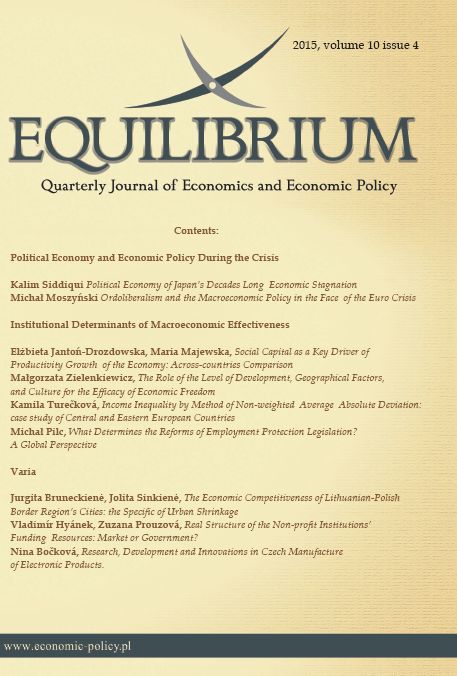Ordoliberalism and the Macroeconomic Policy in the Face of the Euro Crisis
Ordoliberalism and the Macroeconomic Policy in the Face of the Euro Crisis
Author(s): Michał MoszyńskiSubject(s): Economy
Published by: Instytut Badań Gospodarczych
Keywords: Germany; macroeconomic policy; ordoliberalism; rules; economic order
Summary/Abstract: The global economic crisis and the crisis in the euro zone exposed the deep differences of opinion between German economists and scientists from Anglo-Saxon countries. The German approach conceptually differs in the views on the strategies and tools of anti-crisis policy, especially fiscal stimulus in the Keynes-ian-style, quantitative easing monetary policy of the ECB, the question of financial assistance to Greece and restructuring its debt. The other areas of difference are the approach to the rules in macroeconomic policy, fiscal consolidation, and interpretation of current account surplus. Given the size and performance of the German economy it is important to understand the reasons for these opposites, which constitute the research goal of this article. Considerations are based on the thesis that ordoliberal thought still has a strong impact on the practice of macroeconomic policy in Germany and also at the European level. The analysis is built on the short overview of ideological foundations of the German social market economy and its most important postulates, which then will be applied for interpretation of intellectual distinctions between economists from Germany and other countries in the theoretical and practical dimensions of the economic policy observed in Europe. The methodology includes the critical literature studies and the comparative analysis of macroeconomic policy through the prism of economic thought.
Journal: Equilibrium. Quarterly Journal of Economics and Economic Policy
- Issue Year: 10/2015
- Issue No: 4
- Page Range: 41-58
- Page Count: 17
- Language: English

